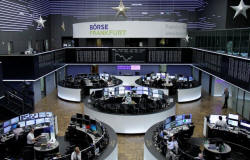Tech tremors spread to financials to spoil global rally
 Send a link to a friend
Send a link to a friend
 [December 06, 2017]
By Helen Reid [December 06, 2017]
By Helen Reid
LONDON (Reuters) - Tremors in technology
stocks spread to Europe and were set to dent U.S. trading on Wednesday,
with weaker metals prices and flagging financials also tripping up a
rally that had taken world equities to record highs.
Investors concerned about high valuations took the top off the tech
sector, where stocks such as Facebook, Alphabet, Tencent <0700.HK>
and Alibaba <BABA.N> have reached prices some describe as
"eye-watering".
Europe's main index of stocks <.MSER> tumbled 0.7 percent, dragged lower
by chipmakers which have been a crucial driver of growth in the sector
and seen stellar price gains this year.
U.S. stocks were set to open lower, with S&P and Dow Jones futures
falling 0.1 to 0.2 percent while futures of the tech-heavy Nasdaq were
down 0.5 percent.

Ken Hsia, European equities portfolio manager at Investec Asset
Management, said he had shifted this year from tech into other sectors,
including financials, which he thought would gain from higher yields and
fiscal stimuli such as U.S. tax cuts.
"Their valuations needed something more heroic in terms of the earnings
growth they were reporting, and we sold some and rotated that into other
parts of the market," he said.
Another negative for the tech sector was a detail of the U.S. tax cut
bill being debated in Congress that would limit the scope of tax credits
that are key for research and development.
But bank stocks were the biggest drag on Europe's STOXX 600 <.STOXX> on
Wednesday as they also slipped back after gaining strongly in the last
week on the tax cut plan, as analysts raised concerns that European
lenders will benefit less than U.S. peers.
MSCI's world equity index <.MIWD00000PUS>, which tracks shares in 47
countries, slipped 0.4 percent, on track for its worst fall in three
weeks.
U.S. market volatility <.VIX> rose again in early trading, its eighth
day of gains in the last 10 as investors grew more jittery about stock
markets driven to pricey levels by optimism about the economy.
"We really don't see great bargains in any market right now with the
U.S. trading at 18.2x price to earnings and 14 percent above its
average, and Europe at 15.1x, 10 percent ahead of the average," said
Jefferies analysts in a note.
European markets mirrored Asian trading, where MSCI's index of
Asia-Pacific shares outside Japan <.MIAPJ0000PUS> dropped 1.5 percent to
a two-month low on weaker metals prices.

The dollar's rise on U.S. tax reform hopes has dented base metals which
are denominated in the currency.
Copper prices bounced slightly, up 0.6 percent from a two-month low, but
European basic resources stocks fell 1 percent as metals weakness fed
through to miners.
[to top of second column] |

The German share price index, DAX board, is seen at the stock
exchange in Frankfurt, Germany, December 5, 2017.
REUTERS/Staff/Remote

Geopolitical risks also loomed. U.S. President Donald Trump is expected to
recognize Jerusalem as the capital of Israel later on Wednesday, a move the
Palestinians' chief envoy to Great Britain said was "declaring war".
In euro zone debt markets, German 10-year government bond yields <DE10YT=RR>
held close to three-month lows on Wednesday as risk-off sentiment drove
investors into safer assets.
The two-year U.S. Treasury yield <US2YT=RR> fell slightly but still hovered near
the nine-year high it had been driven to by the Fed's monetary tightening plans
and hopes tax reform will boost the economy.
The 10-year Treasury yield <US10YT=RR> also declined, but the yield curve
<US2US10=RR> flattened further, near its lowest in a decade. The flattening
yield curve has obsessed investors concerned it may be a sign of imminent market
stress.
"At the moment it is a market signal to watch and interpret; should the Fed
start moving aggressively, however, it will become key to assessing the market's
longer-term economic view," said Edward Park, investment director at Brooks
Macdonald.
The dollar dipped, weighed down by lower long-term U.S. yields. The dollar index
against six major currencies slipped 0.05 percent to 93.329 <.DXY>.

Sterling slipped to $1.3374, down 0.5 percent <GBP=D3> as Prime Minister Theresa
May came under pressure from EU diplomats after Brexit negotiations hit an
impasse, and after a report there would be no Brexit deal this week.
The euro was little changed, down 0.04 percent at $1.1820 <EUR=> after shedding
0.34 percent the previous day.
Bitcoin meanwhile continued its dizzying ascent, hitting a fresh record high of
$12,815.18 on the BitStamp exchange <BTC=BTSP>. The cryptocurrency is up more
than 1,190 percent so far in 2017.
In commodities, U.S. crude oil futures <CLc1> were down 0.7 percent at $57.38
per barrel after American Petroleum Institute data showed that U.S. gasoline
stocks and distillate inventories rose more than expected last week.
Brent crude lost 0.5 percent to $62.66 per barrel.
Emerging stocks fell 1.7 percent to hit a two-month low, having been bruised by
rises in the dollar earlier this week.
(Reporting by Helen Reid; Editing by Catherine Evans)
[© 2017 Thomson Reuters. All rights
reserved.] Copyright 2017 Reuters. All rights reserved. This material may not be published,
broadcast, rewritten or redistributed. |